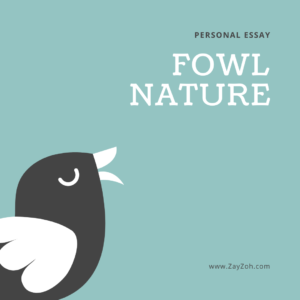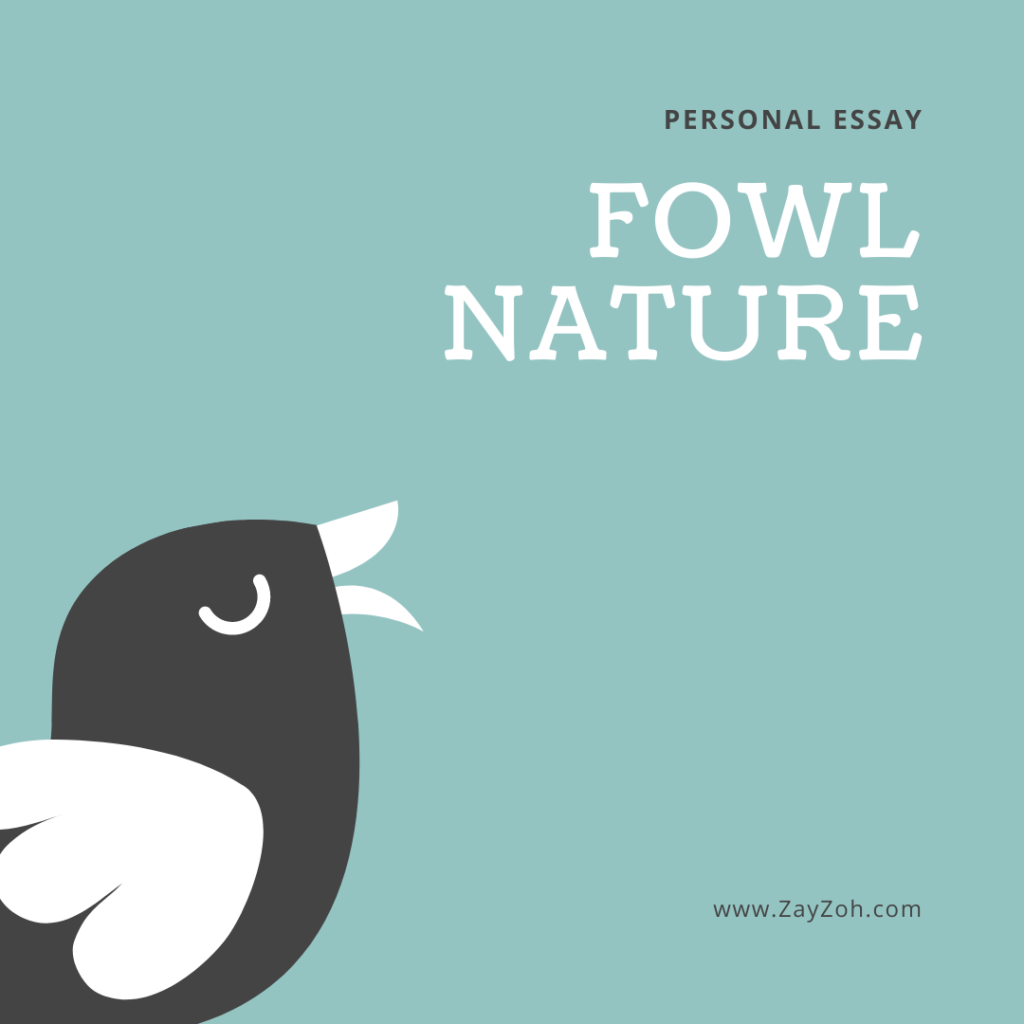Day One: Ducks near me at the park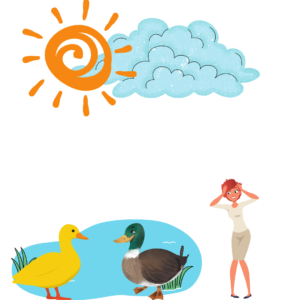
Ducks are ruthless. I suppose this is true of all animals. Elk do not give lions the benefit of the doubt. They know lions intend to eat them, so they run. They don’t concern themselves with offending their furry foes or hurting their feelings. And the lions are neither offended nor insulted. They are hungry. Thus, they attack.
As a human, I grapple with the reality of animal instinct. I project onto them my human logic and reasoning. As ridiculous as it sounds, I expect animals to act humanely. I expect them to be polite and considerate toward each other. I wish them to say in their animal languages, “Excuse me,” “Thank you,” and “My bad.” But of course, such thinking is foolish because they have different norms.
Back to the ducks.
I was recently at a park in Los Angeles with a pond inhabiting ducks, fish, geese, and turtles. The scene was peaceful, except for two geese honking at each other as they sunbathed.
I sat near the pond’s shore. Two ducks–one male, one female– stood nearby dressing their feathers, their long necks curving and bending like contortionists.
Then, from the pond emerged another male duck. He marched onto the shore and made a beeline for the female who didn’t notice his appearance until it was too late. With his neck, he held her down and began humping her from her backside. She quacked and resisted, trying to escape from his hold. She nearly did, but the male, relatively small in stature, was obstinate and wouldn’t let her go.
Her companion, the larger male duck, quacked, expanded his wings, and attacked the offender with his bill. The three birds twisted and coiled like a tumbleweed. Their quacking crescendoed to a chaotic fortissimo before the larger duck pushed the smaller one off his mate and chased him into the pond.
I watched in horror and fascination. I was horrified by the smaller duck’s brutal behavior yet fascinated by his tenacity. His animal instinct spares no room for courtly love as he had no consideration for the time, place, circumstances, and her feelings. Human concerns were of no concern to him. Neither were they of concern to the other ducks. They lived in the moment, fought for survival. And when it was over, it was over. They didn’t replay the encounter again and again in their heads. They didn’t recount the fight to their friends and plot revenge. They moved on, fully present, ready for whatever came next.
Day Two: Pigeons in my ceiling
There are pigeons nesting in my classroom ceiling. They are loud. I hear their talons scraping the tiles as they chirp and chirp and chirp. It sounds like an entire family chattering continuously: mom talking to dad while he listens to grandpa who yells at grandma while the grandchildren are talking to each other and anyone else who will lend an ear. No one is listening to what the other is saying. Or perhaps they are. Maybe they can listen and talk at the same time. What sounds like cacophony to my human ears could be a rational conversation in pigeon-speak. 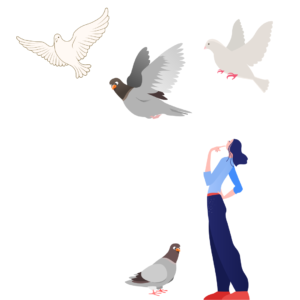
But their conversations are noisy and annoying. During my Zoom classes, I find myself raising my voice so my students can hear me. My students don’t seem to mind or even notice the birds. Perhaps they mute me and can’t hear anything. I want to yell at the fowls, “Will you please shut up! I’m trying to work.” But we don’t speak the same language or share the same values. They do not empathize with me. And my tolerance of them is waning.
I call a plant worker to my classroom. He arrives with a broom in hand. “I don’t think you’ll be needing that,” I say. I was expecting him to listen and assess the situation. Then, summon the proper team to climb the roof and clear out the birds.
Instead, he listens, approaches the tile upon which he thinks they are nesting, and pokes it with the broom. As the tile lifts, the pigeons panic and flutter. Strands of their nest fall onto the floor. They escape from the roof’s opening. “There,” says the plant worker, “They’re gone.”
Two minutes after he leaves, they come back and resume their conversations as if nothing happened.
Day Three: Birds in my chimney
Even at home, they find me. This time, they are in my chimney. I don’t know what kind of bird they are. Once, before I knew better, I tried to smoke them out by turning on my fireplace. The next day, I went outside to find a broken egg on the ground–a casualty of their escape.
For now, I let them be because they don’t stay long. Most, I imagine, are migrating and need a warm bed for a day or two. They are the noisiest at dawn after the dew settles into frost and the sun peeks over the horizon. I hear them waking up. I imagine them yawning and stretching their wings before venturing out to seek breakfast. As they nibble on worms and berries, I envision them unfolding a map and planning their route for the day. 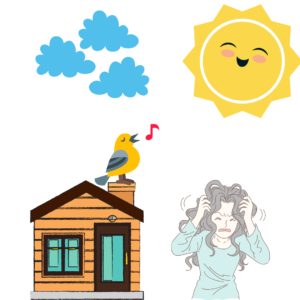
Silly me. Birds don’t need maps. Their GPS is instinctual and accurate. They will make it to their destination on time because they won’t be distracted by thoughts of the egg they lost due to a foolish lady who thought she was acting logically. They won’t feel insulted because she–with her human reasoning–deemed herself superior to their intuition.
It is I who am illogical and unreasonable to assume that animals think and act like humans. My judgment of their behavior is unwarranted and irrelevant. What I call “ruthless” is, to them, rational and necessary. Their response to the moment is untainted by the doubt and uncertainty that hinders me. They are the most honest and clear about who they are what they are here to do.
